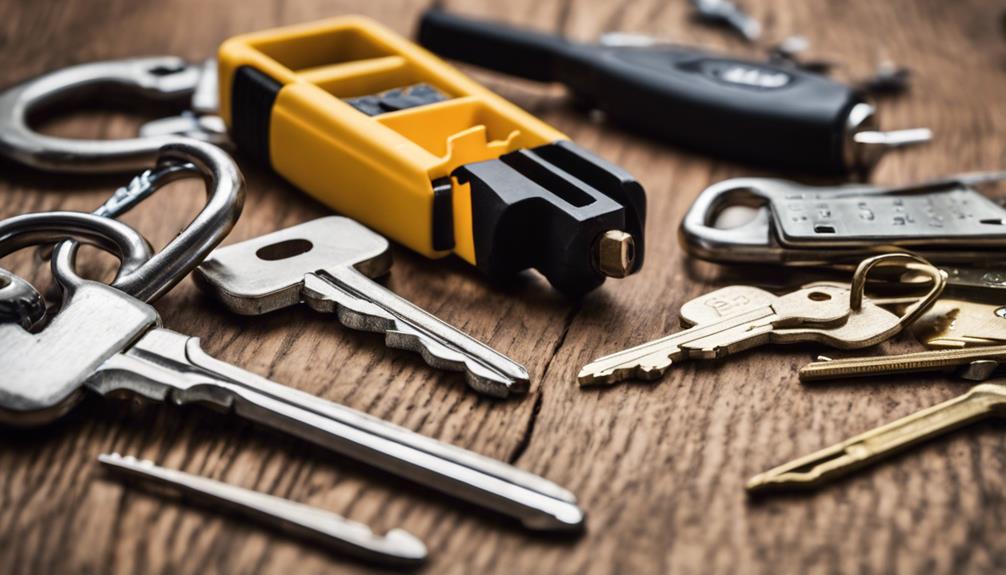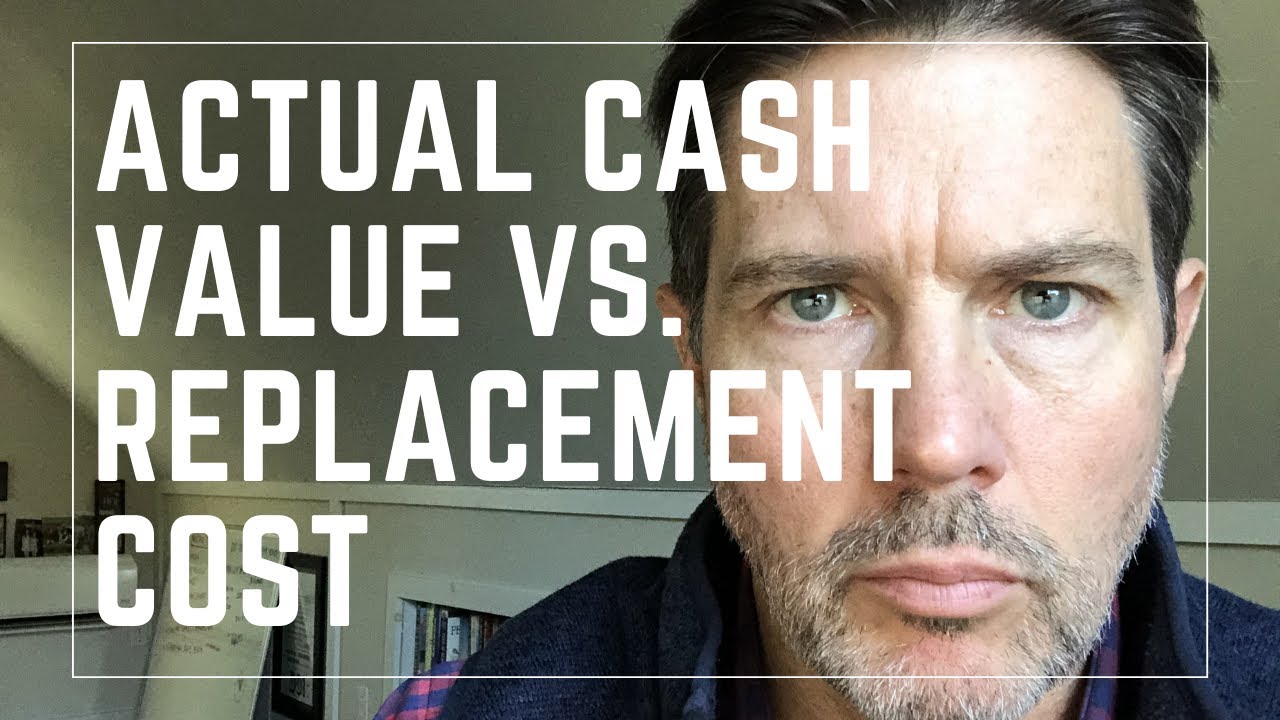When considering lock replacement, several factors can impact the cost. The type of lock, such as deadbolts or smart locks, usually dictates the price, with higher security options costing more. Brand reputation and quality materials also play a role, as well as the complexity of the installation. Your location can affect labor rates, with urban areas often being pricier. Don't forget key duplication needs and any emergency service charges, which can add to your expenses. Understanding these factors helps you make informed choices, and you'll discover even more details to guide your decision.
Key Takeaways
- Lock type and security level significantly influence costs, with higher security locks generally being more expensive due to advanced features.
- Brand reputation affects pricing, with reputable brands typically charging more for high-quality, durable materials and superior security features.
- Installation complexity and labor costs vary, as simple installations are cheaper, while complex ones require more time and expertise, increasing expenses.
- Location impacts pricing, with urban areas often having higher costs due to demand and accessibility challenges compared to rural settings.
- Additional costs arise from key duplication needs and emergency service considerations, including urgency, time of service, and the extent of lock damage.
Lock Type
When it comes to lock replacement costs, the type of lock you choose can make a significant difference. Understanding the lock replacement cost factors helps you make informed decisions that serve your security needs best. Different lock types come with varying levels of complexity and security, each impacting the overall cost.
For instance, understanding costs associated with different lock types can help you choose wisely.
First, consider the lock security level cost. Higher security locks, like deadbolts or smart locks, usually cost more due to advanced features and materials. If you're aiming for enhanced safety for your loved ones or property, investing in a higher security lock is often worthwhile.
Next, think about the lock complexity cost. Simple locks, like knob locks, are generally cheaper to replace, but they may not offer the same level of protection.
More complex locks, which may require specialized installation, will increase labor costs and potentially the materials involved.
Security Level
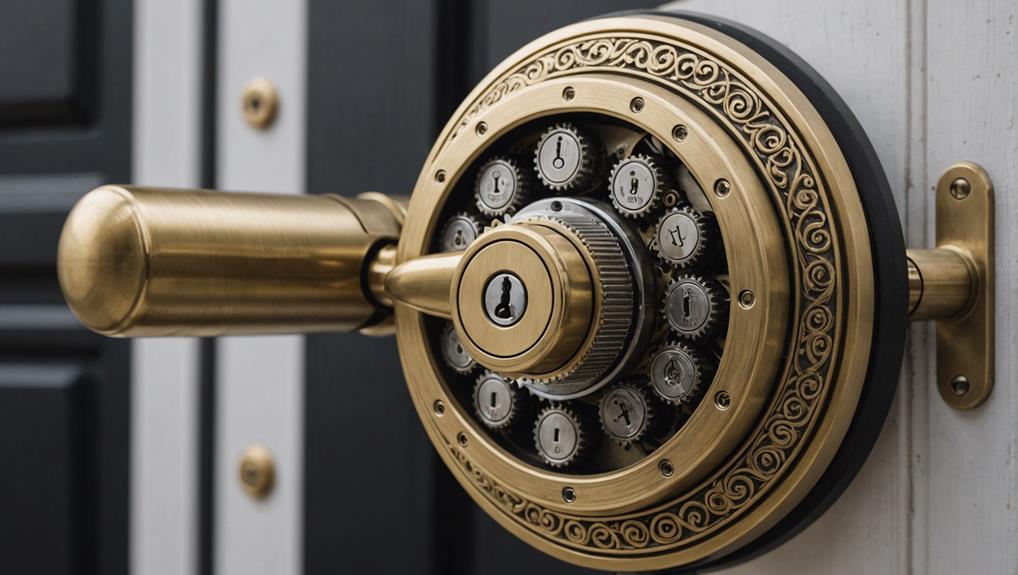
The security level of a lock plays a pivotal role in determining its replacement cost. When you think about replacing a lock, consider how secure it needs to be for the safety of those you serve.
Higher security locks typically incorporate advanced technology and stronger materials, which can greatly increase lock material cost. Investing in quality locks can ultimately save you money in the long run by reducing the risk of break-ins and the associated costs. If you're looking to enhance security, you might invest in a lock with features like pick resistance or key control.
Additionally, the lock installation cost can vary based on the complexity of the lock's design. More complex locks may require professional installation, leading to higher labor costs. It's important to weigh these factors when planning your budget.
Moreover, you should keep an eye on lock brand pricing. Reputable brands often charge more due to their commitment to quality and security.
While you might be tempted to opt for the cheapest option, investing in a higher security lock can provide peace of mind for you and those you serve. Remember, when it comes to securing a space, it's worth spending a little more to guarantee safety and reliability.
Brand and Manufacturer
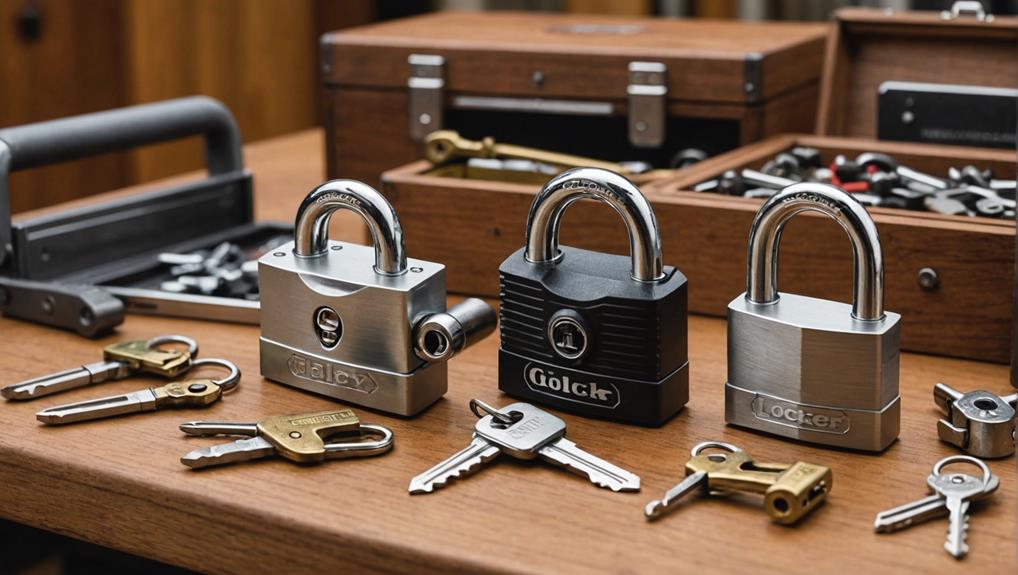
When choosing a lock, the brand and manufacturer play an essential role in determining its quality and reliability.
High-quality locks often come with advanced security features and durable materials, which can be found in choosing the perfect lock.
You'll want to take into account the materials used, the security features offered, and the warranty and support available.
These factors can greatly impact the overall cost of lock replacement and your peace of mind.
Quality of Materials
Choosing high-quality materials for your lock replacement can greatly impact both the cost and security of your home. When you invest in durable and reliable locks, you're not just paying for the product itself; you're considering the long-term benefits of enhanced safety and peace of mind.
The brand and manufacturer play significant roles in determining the quality of materials, and this is one of the primary factors affecting lock cost. For instance, reputable brands often use superior metals and advanced manufacturing processes, which can lead to higher locksmith pricing factors.
While it might be tempting to opt for cheaper options, remember that lower-quality materials can compromise the integrity of your locks. You want to guarantee that the locks you choose can withstand wear and tear, as well as potential break-ins.
Security Features Offered
In evaluating lock replacement options, the security features offered by different brands and manufacturers can make a significant difference in both safety and cost. When you're choosing a lock, consider features like keyless entry, smart technology, and pick-resistant designs. Investing in high-quality locks not only enhances security but can also save you from potential losses.
To help you understand some common security features, here's a comparison of various brands:
| Brand | Security Features |
|---|---|
| Brand A | Keyless entry, smartphone control |
| Brand B | Biometric access, anti-drill protection |
| Brand C | Smart alerts, remote locking |
| Brand D | Heavy-duty construction, pick-resistant |
Each brand offers unique advantages that cater to different needs. By carefully evaluating these features, you can choose a lock that not only meets your safety requirements but also fits your budget. Remember, it's not just about replacing a lock; it's about enhancing the security of your home and serving your loved ones with peace of mind. Prioritize features that will best protect your space and your family.
Warranty and Support
A solid warranty and reliable support from a lock's brand or manufacturer can greatly influence your overall satisfaction and peace of mind. When you invest in a lock, knowing that you have strong backing can make all the difference.
Here are three key aspects to evaluate:
- Warranty Length: A longer warranty often indicates the manufacturer's confidence in their product's durability and performance. It shows they stand behind their locks.
- Customer Support Availability: Reliable customer support means you can get help when you need it. Check if they offer multiple ways to reach them, like phone, email, or live chat.
- Repair and Replacement Policies: Understand what the warranty covers. If your lock fails, will they repair it, or will you need to replace it? Clear policies can save you time and money.
Installation Complexity
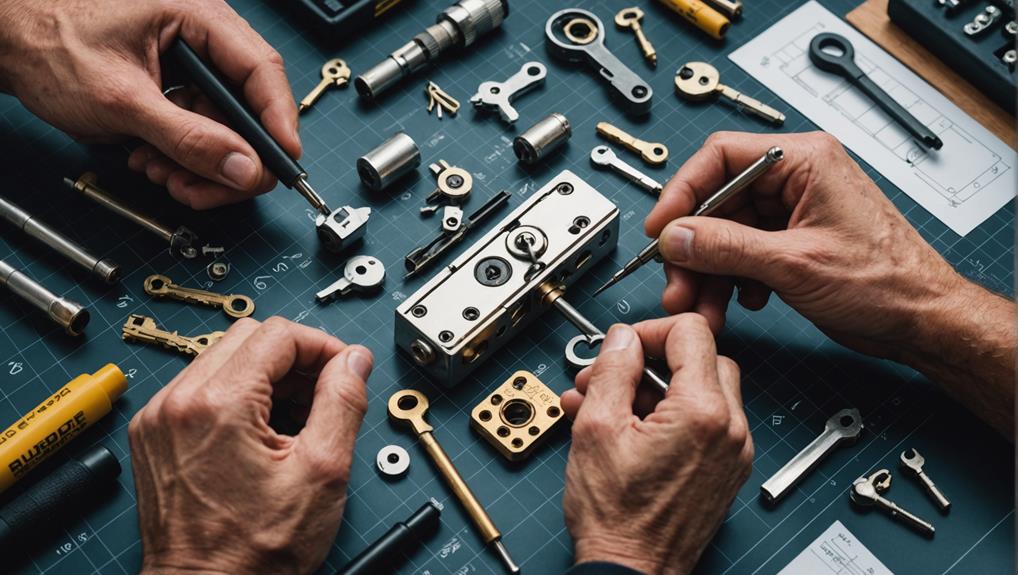
How much does installation complexity really influence lock replacement costs? When you're considering a lock replacement, the ease or difficulty of the installation process plays a significant role in determining the overall expense.
If the lock fits seamlessly into your existing door setup, you're likely to pay less. Simple installations often require minimal labor, saving you money and time. Additionally, proper lock replacement is essential for maintaining essential business security, ensuring that your property is safeguarded against potential threats.
However, if the installation involves intricate adjustments—like resizing the door or reinforcing the frame—costs can climb. Complex installations may require skilled professionals with specialized tools, which adds to the labor cost.
Additionally, if you're opting for high-security locks that necessitate more elaborate installation methods, expect to pay a premium.
Location and Accessibility
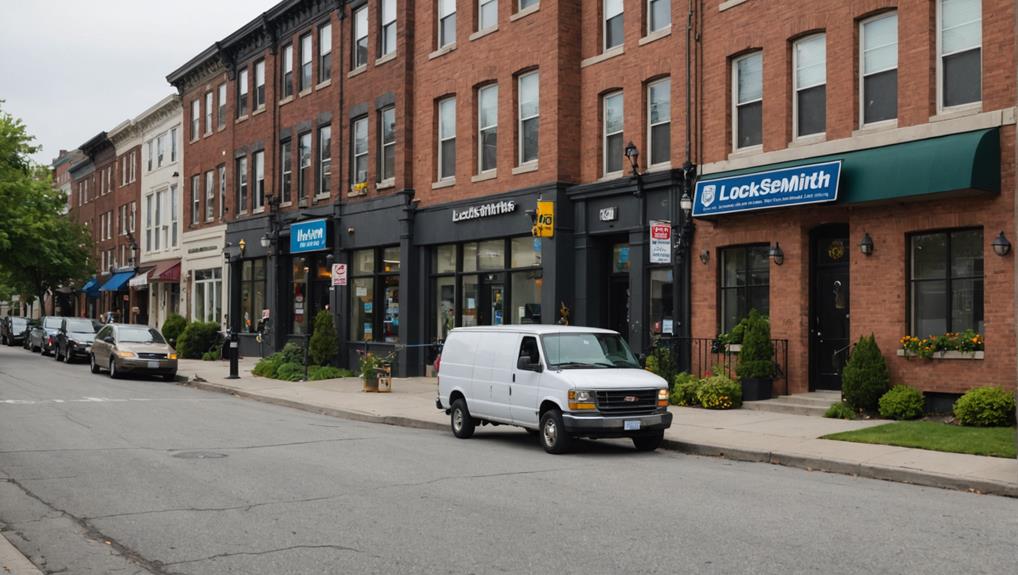
When it comes to lock replacement costs, your location and the type of building play a significant role. Urban areas might've higher prices due to increased demand and accessibility challenges, while rural settings could offer more straightforward, cost-effective solutions.
For instance, understanding variations in lock replacement costs can help homeowners make informed decisions.
Additionally, if emergency access is a concern, that can affect both the complexity and cost of the installation.
Urban vs. Rural Areas
Taking into account location and accessibility, the cost of lock replacement can vary considerably between urban and rural areas. In urban settings, higher demand and living costs often drive prices up, while rural locations may offer lower rates but could face limited service options.
Understanding these differences can help you make informed decisions when serving others in need of lock replacement.
Here are three key factors to assess:
- Availability of Services: In urban areas, locksmiths are plentiful, which can lead to competitive pricing. In contrast, rural areas might've fewer locksmiths, possibly increasing costs due to limited options.
- Travel Time and Distance: Urban locksmiths can usually reach clients quickly, keeping labor costs lower. In rural areas, longer travel distances can add to overall expenses.
- Emergency Services: Urban locksmiths often offer 24/7 services, which may come at a premium. In rural areas, emergency services mightn't be as readily available, affecting both response times and pricing.
Building Type and Structure
The type and structure of a building greatly influence lock replacement costs. If you're working with a residential home, the process might be simpler and less expensive than in a commercial property. For instance, the locks in a single-family house may require standard tools and minimal labor, while a multi-story office building may need specialized equipment and more extensive work due to its complex security systems.
Accessibility plays a significant role too. If the lock is located in a hard-to-reach area, like a tall commercial building or a secure storage facility, you may face higher labor costs. Technicians often need ladders, lifts, or additional personnel to guarantee safety and efficiency, which can drive up the total price.
The building's materials also matter. A historical structure might require custom locks to maintain its aesthetic, while newer constructions may accommodate standard replacements.
Understanding these factors can help you better serve your clients by providing accurate estimates and guaranteeing their needs are met effectively. By considering the building type and structure, you can facilitate a more streamlined and cost-effective lock replacement process.
Emergency Access Considerations
Emergency access hinges on both location and accessibility, which can greatly impact lock replacement costs. When you're considering replacing locks, you need to think about how easily emergency personnel can reach those locks.
If your locks are located in hard-to-reach areas, or if they require special access, you might face additional costs.
Here are three key factors to keep in mind:
- Proximity to Exits: Locks located near main exits or emergency routes are easier and cheaper to replace than those hidden away in less accessible areas.
- Building Layout: If your building features multiple floors or unique architectural designs, it can complicate access for locksmiths, increasing labor time and costs.
- Security Features: Advanced locks with extra security measures can be more challenging to replace, particularly in emergency situations, which can lead to higher expenses.
Additional Features
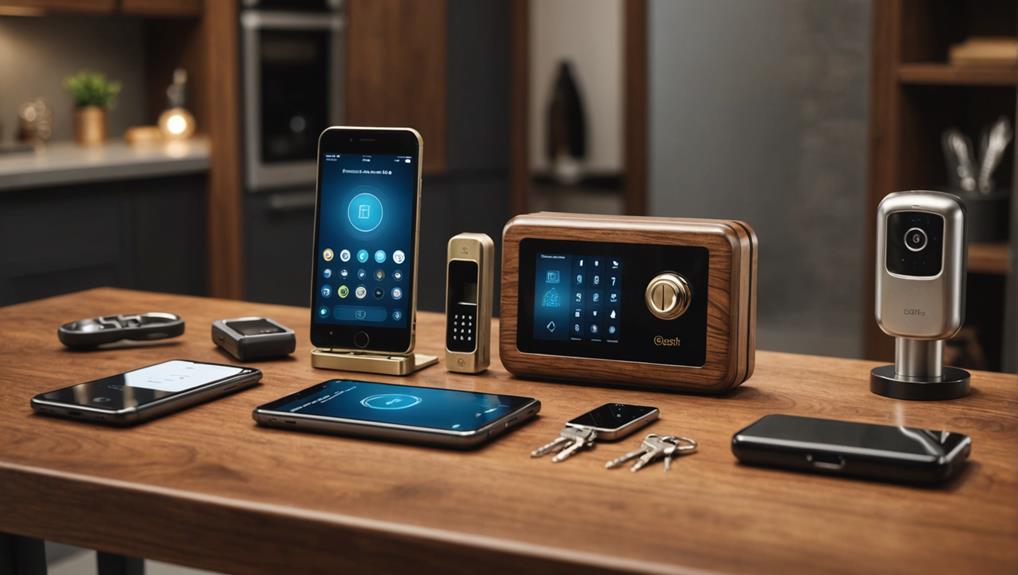
Many homeowners overlook how additional features can impact lock replacement costs. When you're evaluating a lock replacement, think about what features you truly need.
For instance, smart locks offer convenience and enhanced security but often come with a higher price tag. Smart locks provide easy access through keyless entry, which is especially helpful for family members or guests who may forget their keys. If you're looking to serve others, you might want to invest in locks that provide keyless entry, which is especially helpful for family members or guests who may forget their keys.
Another feature to examine is the level of resistance to picking and bumping. Higher-quality locks with advanced security features can save you money in the long run by preventing unauthorized access.
You might also want to look into locks that offer integration with home security systems. While these options may have an upfront cost, they can give you peace of mind and enhance the safety of everyone in your home.
Labor Costs
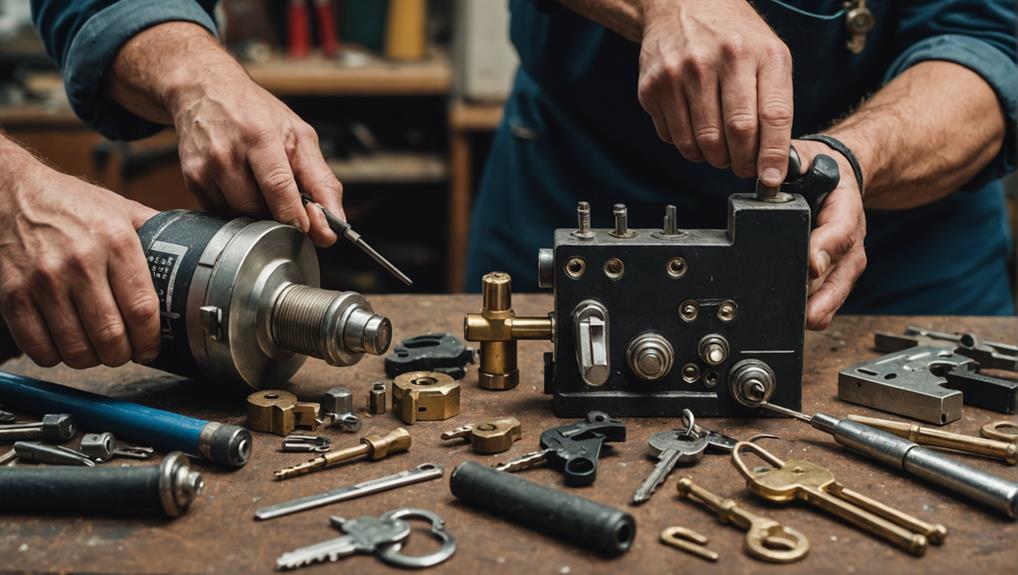
When considering lock replacement, it's not just the features that can affect your budget; labor costs play a considerable role too.
You'll want to factor in the expertise and time required for installation. Hiring a professional guarantees the job's done correctly, but it can vary based on a few key elements. Understanding the costs involved in hiring a professional for lock replacement can also help you budget effectively.
Here are three factors that can influence labor costs:
- Complexity of the Job: If you're replacing a basic lock, it may take less time compared to installing a high-security system, which might require additional adjustments.
- Location: Depending on where you live, labor rates can differ greatly. Urban areas often have higher rates due to demand and cost of living.
- Professional Experience: A seasoned locksmith might charge more for their services, but their expertise can save you time and potential headaches in the long run.
Key Duplication Needs
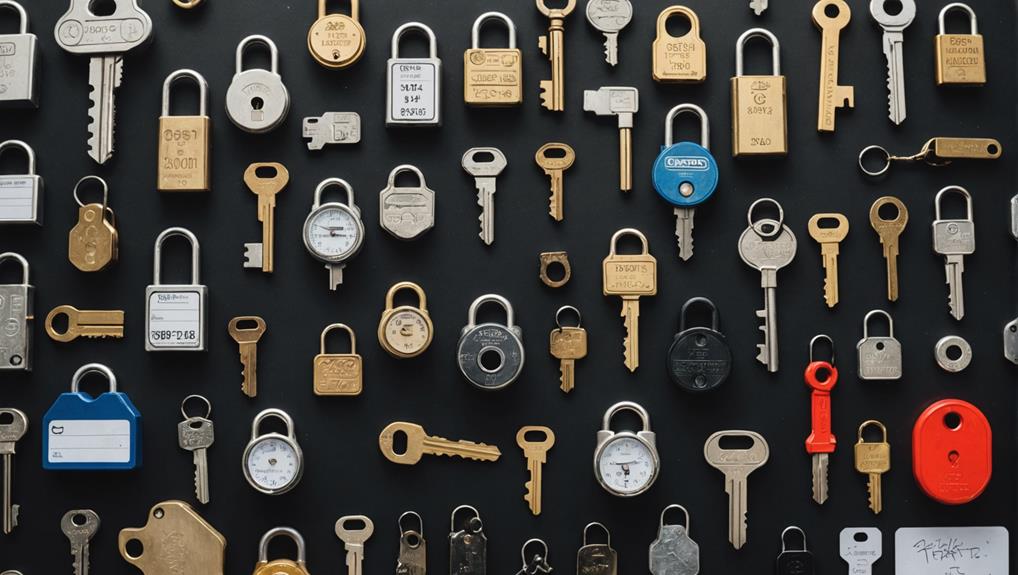
Key duplication needs can greatly impact your overall lock replacement costs. When you're considering replacing locks, think about how many keys you'll need. Each additional key means extra expenses, so it's important to plan accordingly. If you're serving others, making sure everyone has access while keeping security in mind is vital.
Here's a breakdown of potential costs based on key types:
| Key Type | Average Cost per Key | Quantity Needed |
|---|---|---|
| Standard Key | $2 – $5 | 1 – 5 |
| High-Security Key | $5 – $15 | 1 – 3 |
| Transponder Key | $50 – $150 | 1 – 2 |
| Master Key | $10 – $25 | 1 – 5 |
| Key Fob | $100 – $300 | 1 – 2 |
As you can see, the type of key you need can substantially affect your budget. Planning for these costs not only helps you manage your finances but also guarantees that everyone you serve has the access they need. Always remember to account for any special key duplication needs before finalizing your lock replacement.
Emergency Services Considerations
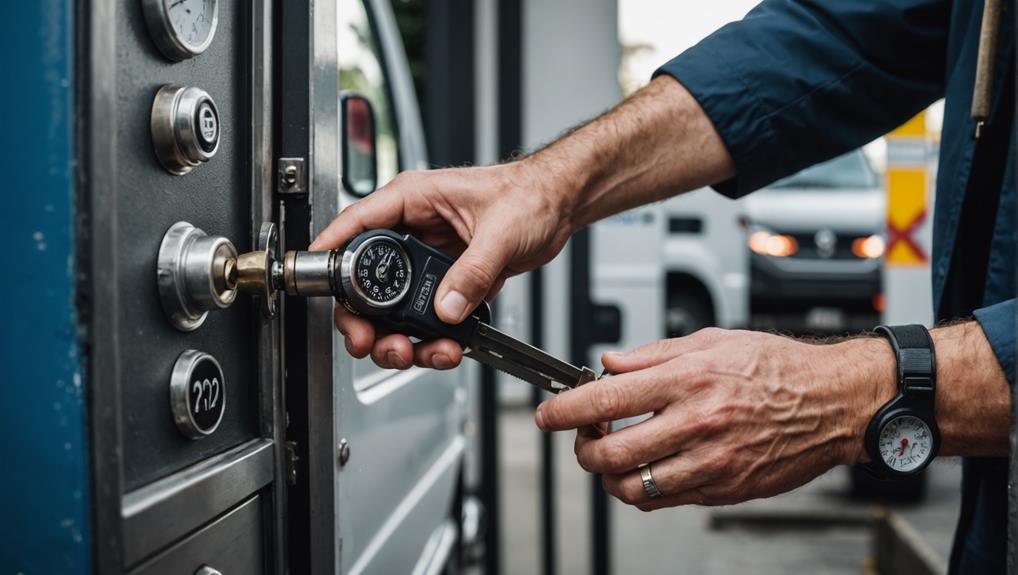
While emergencies can arise unexpectedly, knowing how they impact your lock replacement decisions is vital.
When you find yourself in a lock-related crisis, it's important to understand how emergency services can affect costs and choices. Factors such as the overall market demand and the locksmith's experience can also play significant roles in determining the final price you pay for services like understanding emergency lock replacement costs.
Here are three considerations for emergency lock replacement services:
- Response Time: The quicker a locksmith can arrive, the more you may pay. If you're in a hurry, opting for a service that promises rapid response can come with a premium.
- Time of Day: Emergency services often charge higher rates during off-hours or weekends. If you're locked out late at night or on a holiday, expect to see an increase in labor costs.
- Complexity of the Situation: If your lock damage is extensive or requires specialized tools, costs can escalate. Evaluating the situation can help you communicate effectively with the locksmith.
Frequently Asked Questions
How Often Should I Replace My Locks?
You should consider replacing your locks every few years or whenever you move into a new home. This guarantees your security remains a priority.
If you've experienced a break-in or lost your keys, it's wise to replace them immediately. Regular maintenance checks help identify wear and tear, so stay proactive.
Keeping your locks updated not only protects you but also gives peace of mind, allowing you to focus on serving others confidently.
Can I Replace My Locks Myself?
Replacing your locks yourself can feel like starting a DIY adventure, where every turn of the screwdriver brings you closer to newfound security.
You can absolutely tackle this task, especially if you've got the right tools and a bit of patience. Just follow the manufacturer's instructions carefully, and don't hesitate to reach out for help if you hit a snag.
Your effort not only bolsters your safety but also empowers your home.
What's the Average Lifespan of a Lock?
The average lifespan of a lock typically ranges from 5 to 15 years, depending on the type and usage.
If you've got high-traffic areas, you might notice wear sooner. Regular maintenance can help extend that lifespan.
You should also consider the environment; harsh weather conditions can affect durability.
Keeping an eye on your locks and replacing them when needed guarantees your home stays secure and safe for everyone you care about.
Do Smart Locks Require Special Installation?
Ever tried fitting a square peg into a round hole? Smart locks often need specific installation procedures.
You might find that some models replace traditional locks easily, while others require more intricate setups or professional help.
It's crucial to read the manufacturer's guidelines before diving in.
Are There Warranties for Lock Replacements?
Yes, there are warranties for lock replacements!
Most manufacturers offer warranties that cover defects and provide peace of mind.
When you get a lock replaced, check if the locksmith or installation service provides a warranty as well.
It's always a good idea to ask about the terms, so you know what's covered.
This way, you can guarantee your investment is protected and you're serving others by providing secure solutions.
Conclusion
So, while you might think all locks are created equal, it turns out that replacing one can feel like planning a wedding. With factors like lock type, security level, and even your location playing a role, you could end up spending more than you'd planned. Just remember, the next time you're locked out, it's not just the door that needs replacing—it's your budget too! Who knew security could be so expensive?

